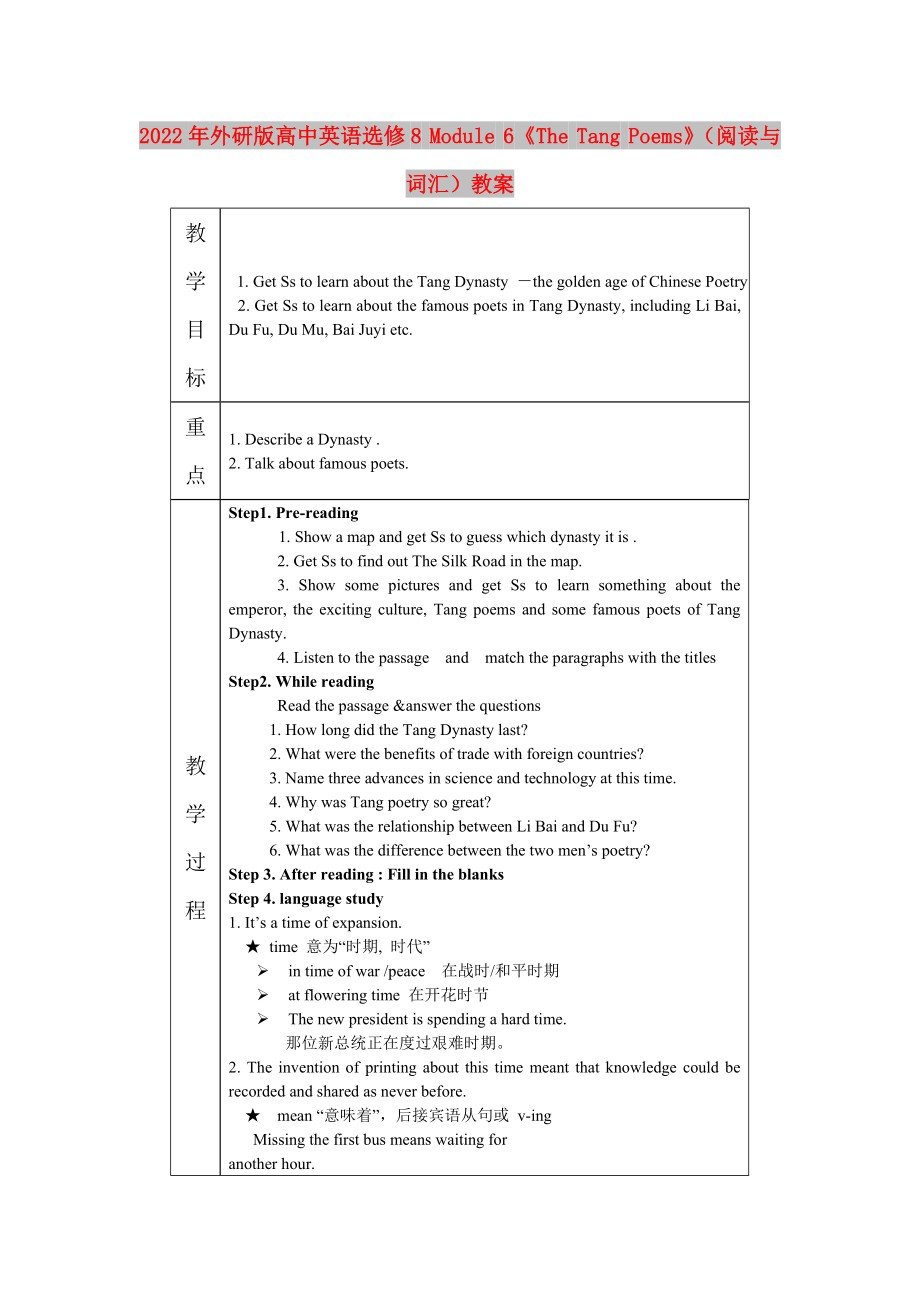《2022年外研版高中英語(yǔ)選修8 Module 6《The Tang Poems》(閱讀與詞匯)教案》由會(huì)員分享����,可在線閱讀,更多相關(guān)《2022年外研版高中英語(yǔ)選修8 Module 6《The Tang Poems》(閱讀與詞匯)教案(3頁(yè)珍藏版)》請(qǐng)?jiān)谘b配圖網(wǎng)上搜索����。
1、2022年外研版高中英語(yǔ)選修8 Module 6《The Tang Poems》(閱讀與詞匯)教案
教 學(xué)
目 標(biāo)
1. Get Ss to learn about the Tang Dynasty -the golden age of Chinese Poetry
2. Get Ss to learn about the famous poets in Tang Dynasty, including Li Bai, Du Fu, Du Mu, Bai Juyi etc.
重 點(diǎn)
1. Describe a Dynasty .
2. Talk about famous po
2�、ets.
教 學(xué)
過(guò) 程
Step1. Pre-reading
1. Show a map and get Ss to guess which dynasty it is .
2. Get Ss to find out The Silk Road in the map.
3. Show some pictures and get Ss to learn something about the emperor, the exciting culture, Tang poems and some famous poets of Tang Dynasty.
3、 4. Listen to the passage and match the paragraphs with the titles
Step2. While reading
Read the passage &answer the questions
1. How long did the Tang Dynasty last?
2. What were the benefits of trade with foreign countries?
3. Name three advances in
4����、 science and technology at this time.
4. Why was Tang poetry so great?
5. What was the relationship between Li Bai and Du Fu?
6. What was the difference between the two men’s poetry?
Step 3. After reading : Fill in the blanks
Step 4. language study
1. It’s a time of expansion.
★ time 意為“
5、時(shí)期, 時(shí)代”
? in time of war /peace 在戰(zhàn)時(shí)/和平時(shí)期
? at flowering time 在開(kāi)花時(shí)節(jié)
? The new president is spending a hard time.
那位新總統(tǒng)正在度過(guò)艱難時(shí)期�。
2. The invention of printing about this time meant that knowledge could be recorded and shared as never before.
★ mean “意味著”,后接賓語(yǔ)從句或 v-ing
Missing the
6�、first bus means waiting for
another hour.
★ mean “打算���,企圖”,后接動(dòng)詞不定式�。
I’m sorry I didn’t mean to hurt you.
3. Soon Japan and Korea were organized on the Tang Model, while Chinese influence extended throughout Southeast Asia.
★ on…modal =on the modal of…
參照…的模式, 仿照…的樣子
? He opened a bar on
7、 the American model.
他參照美國(guó)的模式開(kāi)了一家酒吧���。
? Now many people celebrate Christmas on the model of western countries.
現(xiàn)在很多人照西方國(guó)家的樣子慶祝
圣誕節(jié)
4. But it was not just scientific knowledge that could now reach a wider audience. It was only in the 11th century that his poetic genius was recognised.
8�、★ It is/was…that 為強(qiáng)調(diào)句型
? It is I who am going to the Great Wall
tomorrow. 是我明天要去長(zhǎng)城(被強(qiáng)調(diào)部分
為指人的名詞或代詞時(shí)�,一般用who)
? It was not until yesterday that the little
boy realised he was cheated.
直到昨天,那個(gè)小男孩才意識(shí)到他被騙了
5. …in fact, he thought of himself as a failure.
★ think of 認(rèn)為����;評(píng)價(jià);想起���,記起
★ think o
9����、f …as… 認(rèn)為…是…
? What do you think of the concert last night?
你認(rèn)為昨晚的音樂(lè)會(huì)怎么樣���?
? The president thought highly of his work.
總統(tǒng)高度贊揚(yáng)了他所做的作品�。
? To tell the truth, our teacher thought little
of you. 說(shuō)實(shí)話�,老師對(duì)你評(píng)價(jià)不高�。
? Little children often think of what the
teacher says as a truth.
小孩總是把老師的話看作是真理�。
 2022年外研版高中英語(yǔ)選修8 Module 6《The Tang Poems》(閱讀與詞匯)教案
2022年外研版高中英語(yǔ)選修8 Module 6《The Tang Poems》(閱讀與詞匯)教案

